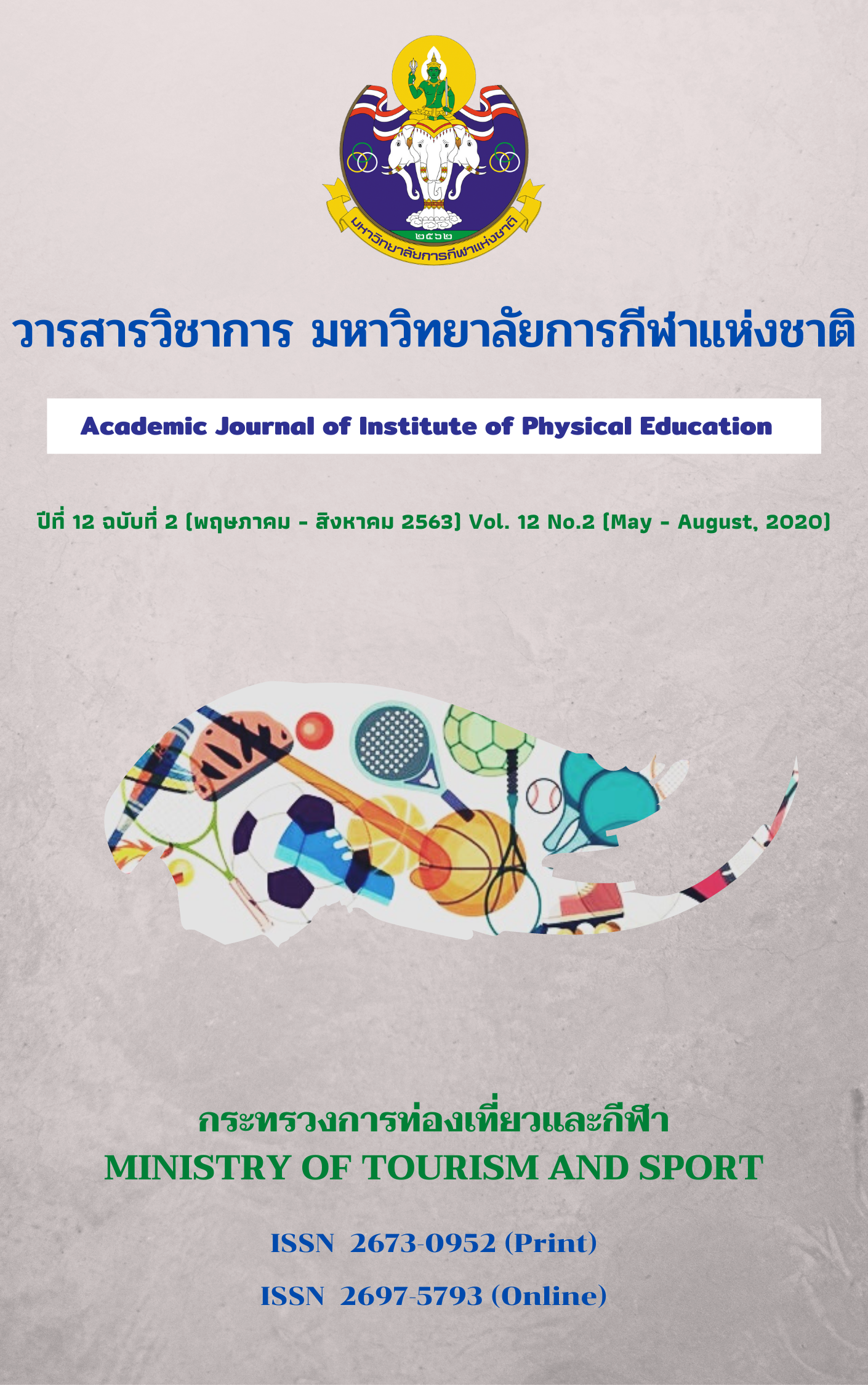THE DEVELOPMENT OF INSTRUCTIONAL MODEL TO PROMOTE ANALYTICAL THINKING OF STUDENTS AT THE FACULTY OF EDUCATION, INSTITUTE OF PHYSICAL EDUCATION
Main Article Content
Abstract
The purposes of this study were 1) to develop the instructional model to promote analytical thinking of students at the Faculty of Education, Institute of Physical Education and 2) to study the results of the implementation of the developed instructional model. The research procedure was divided into two phases. The first phase was the development of the instructional model. In the second phase, the instructional model was implemented and the effectiveness of the model was evaluated. The samples of this study were 30 students at the Faculty of Education, Institute of Physical Education, Yala Campus. The research instruments were 1) instructional model to promote analytical thinking of students, 2) the manual of instructional model to enhance students’ analytical ability, 3) lesson plans, 4) analytical thinking test, and 5) learning achievement test. The statistics used in data analysis were mean, percentage, standard deviation and t-test for dependent.
The findings of this study were as follows: 1. The instructional model to promote analytical thinking of students of the Faculty of Education, Institute of Physical Education was called “PMPCA Model”. It consisted of four components: 1) principles, 2) objectives, 3) the instructional process, and 4) measurement and evaluations. The teaching processes comprised of five steps: 1) Preparation for thinking, 2) Motivation through situations, 3) Planning and inquiry, 4) Construction and sharing and 5) Application and reflection. The overall efficiency of the model was at the highest level. (= 4.68, SD = 0.578), and 2. The results of PMPCA Model implementation were as follows; 2.1 The mean scores of students’ analytical thinking after participating in the developed model were significantly higher than that in the pretest at the .05 level and higher than 75 percent at the .05 level. 2.2 The mean scores of students’ learning achievement after participating in the developed model were significantly higher than that in the pretest at the .05 level but lower than 75 percent at the .05 level.
Article Details
The published article is a copyright of the Academic Journal of Thailand National Sports University. The passage appeared in each article in this academic journal is a perspective of each author which is not related to the journal. Each author is required to be responsible for all components of his/her own article. If there are any mistakes, each author must be responsible for those mistakes on his/her own.
References
Anderson, L.W., Krathwohl, D.R., Airasian, P.W., Cruikshank, K.A., Mayer, R.E., Pintrich, P.R., Raths, J.& Wittrock, M.C. (2001). A taxonomy for learning, teaching, and assessing. Addison Wesley Longman.
Amer, A. (2005). Analytical Thinking. Faculty of Engineering: Cairo University. Retrieved March 20, 2014, from http://www.graspthesolution.com/downloads/AnalyticalThinking.pdf.
Arende, R.I. (2012). Learning to teach. (10th ed.). Boston: Pearson Education.
Chade Sirisawat. (2013). The science instruction consistency on constructionism theory for science project creating. Faculty of Education Journal, 24(1) October 2012-January 2013, 1-15.
Chidchanok Choengchaw, Orathip Pheturai & Narongsak Robcrob. (2016). An appropriate learning management for students with different style of learning at state-run universities in three southernmost provinces. Prince of Songkla University Pattani campus.
Griffith, R. (2004). Knowledge production and the research-teaching nexus: The case of the built environment disciplines. Studies in Higher Education, 29(6), 709-726.
Healey, M. (2005). Linking research and teaching: Exploring disciplinary spaces and the role of inquiry-based learning. Reshaping the University: New Relationships between Research, Scholarship and Teaching. Maidenhead: McGraw Hill, Open University Press.
Institute of Physical Education. (2013). Institute of Physical Education Strategic 2013-2017. Chonburi.
Joyce, B. & Weil, M. & Calhoun, E. (2015). Model of Teaching. (9th ed.). Boston: Pearson Education.
Kewalin Kalunchai. (2017). Effects of cognitive behavioral modification on test anxiety of ninth grade students. (Master's thesis). Chulalongkorn University.
Kriengsak Chareonwongsak. (2010). Analytical Thinking. (6th ed.). Bangkok: Success Medai.
Kongrat Nualpang. (2011). A development of an instructional model for enhancing disciplined mind, synthesizing mind and creating mind for undergraduate students at the Faculty of Education, Burapha University. (Doctoral dissertation). Srinakharinwirot University.
Marzano, R.J., & Kendall, J.S. (2007). The New Taxonomy of Educational Objectives. (2nd ed.). The United States of America: Corwin Press.
Ormrod, J.E. (2012). Human learning. (6th ed.). Boston: Pearson Education.
Paitoon Sinlarat. (2014). Principles and techniques of teaching in higher education. (4th ed.). Bangkok: Publisher of Chulalongkorn University.
Praphansiri Susawraj. (2013). Development of thinking. (5th ed.). Bangkok: Limited Partnership 119 Printing Techniques.
Pruet Siribanpitak. (2012). Critical Education Analysis: Basic Education Issues. (3rd ed.). Bangkok: Thai Samphan Printing Factory.
Suchin Petrak. (2005). Learning process management for constructionism in Thailand. Research report. (2nd ed.). Bangkok: Teachers Council Printing Center, Ladprao.
Tissana Khemmani. (2011). Analysis, synthesis, creative and critical thinking skills: integration in teaching–learning plan. Royal Academy Journal, 36(2), April-June 2011, 18-204.
Tissana Khemmani. (2012). Science of Teaching Pedagogy: knowledge for organizing effective learning processes. (15th ed.). Bangkok: Publisher of Chulalongkorn University.
Vicharn Panich. (n.d). 21th Century Skills. Bangkok: Siam Commercial Foundation.
Vichit Suratruangchai. (2007). Educational research & development. Journal of Curriculum and Instruction, 1(1), October 2006 - March 2007, 2-9.
Watchara Laoriandee. (2011). Learning styles and strategies to develop thinking skills. (7th ed.). Nakhon Pathom: Faculty of Education Silpakorn University.


